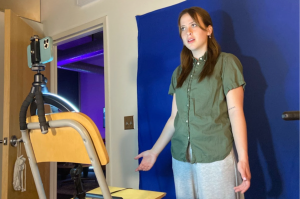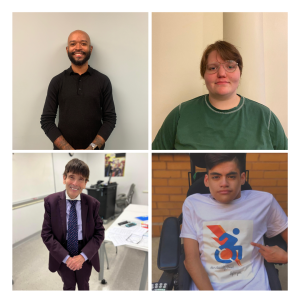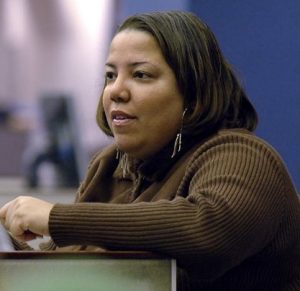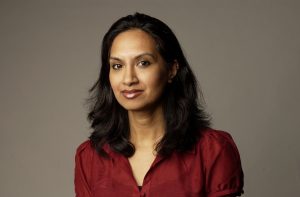Young adults are less trusting of the media than ever, according to a recent Gallup poll. While 53% of respondents over age 65 said they have trust in the media, only 33% of those under age 30 said they do.
One college student, Bethany Bluhm, said that her perception of news organizations might be improved if they used more respectful rhetoric and admitted their biases.
“It’s very hard to find a reliable journalism source,” she said. “I think no matter what you do you’re always going to have some sort of bias creep in.”
Bluhm grew up in Nashville, Tennessee, and is now in her first year at the School of the Art Institute of Chicago.
“I don’t expect a news organization to be 100% right,” she said. “As long as they’re in the pursuit of truth, I think it’s good, but I feel like today it’s more about opinion than actual fact.”
LUKE MOSS: What would you say is your standard news diet?
BETHANY BLUHM: I go on binges. I’ll listen a lot for one week and the next week I relieve myself from it because listening to too much news nowadays can kind of get depressing. So I try to step back and take a breather every now and then.
When you do get into the news, you really try to dive in.
Yeah, I try to dive in. Usually to find a source I go on incognito mode so then it’s refreshed and doesn’t have past searches. I double check the facts with the federal facts that are given out by the government. If two or three match up then I say, “Oh, this is a respectable, credible source,” and go from there.
What are you go-to sources?
I listen to Ben Shapiro, Steven Crowder* and Lauren Chen.
Most of your news consumption is through new media?
Yeah, through YouTube and podcast. If somebody makes a claim, whether it be Ben Shapiro or Steven Crowder* or somebody else, I try to do the research for myself if it’s very important to me. If that topic isn’t as important to me then I won’t delve into it too much because I just don’t have the time. I’ll take their word for it because I find them trustworthy.
You don’t have the time because you’re a student.
Yeah, and usually when I listen to a podcast I’m also cleaning. I can multitask. When I research stuff in depth, like when I was researching the abortion argument, I took an entire three or four hours. I just don’t have the time to do that for every single topic.
What value do you get out of the news? Why does it matter to you to be informed on those topics like abortion or whatever interests you?
This is little patriotic, but I think it’s your civic duty to be informed on the facts. Even if you’re opposing sides from me, you should be able to rationalize your argument. If you can read the facts raw and come to a conclusion on your own then I feel like that’s what’s important. You need to be informed so you can make informed decisions when you vote.
What do you think the media could do that would improve your perception of them?
For one, start treating each other with respect. Second of all, admit their biases. I guess that’s why I really enjoy the independent YouTube podcasts because they’re like, “Hey, we’re conservative and we have a conservative point of view.” They admit that up front, they don’t try to hide it. One thing I do really appreciate — Ben Shapiro recently brought on Andrew Yang. He’s a Democratic presidential candidate. They just had a really great discussion and actually made me more sympathetic to the Democratic view. I feel like we need more of that.
*YouTube recently suspended monetization on conservative commentator Steven Crowder’s channel after he repeatedly mocked Vox journalist Carlos Maza’s sexual orientation and ethnicity. In a series of tweets posted on May 30, Maza exposed Crowder’s homophobic and racist jokes and also criticized YouTube for failing to enforce its harassment and cyberbullying policies. YouTube’s initial response on June 4 determined that Crowder hadn’t violated their terms of service and was met with media backlash. The decision was reviewed and reversed less than 24 hours later, however, and Crowder’s channel was demonetized because of “a pattern of egregious actions” that “harmed the broader community.” YouTube’s Community and Ad-Friendly Guidelines were also updated.






















Be First to Comment